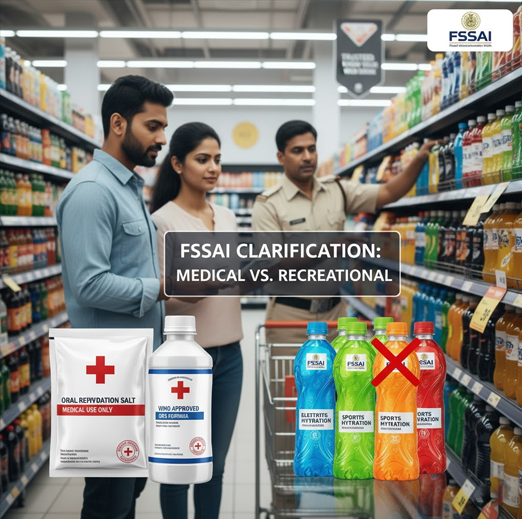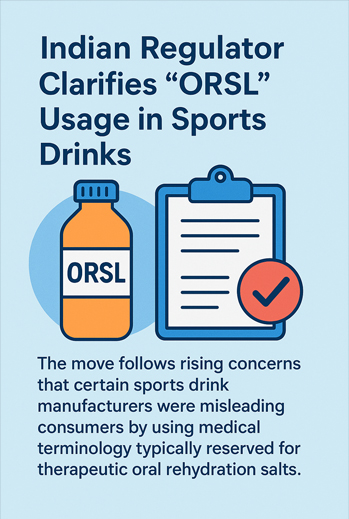Premium Biz Post – In a recent development, India’s top food safety authority has released a clarification regarding the use of the term “ORSL” (Oral Rehydration Solution-Like) by beverage companies. The move follows rising concerns that certain sports drink manufacturers were misleading consumers by using medical terminology typically reserved for therapeutic oral rehydration salts. This clarification marks a significant step in regulating product labeling and maintaining consumer trust in India’s rapidly expanding food and beverages industry.

The Background: Confusion Between Medical and Consumer Products
The controversy began when several commercial beverage brands started marketing their sports drinks using terminology similar to “ORS,” a term commonly associated with medical-grade Oral Rehydration Solutions. These medically approved ORS formulations are designed to prevent and treat dehydration caused by diarrhea or heat exhaustion.
However, some sports drinks used the label “ORSL” or “ORS-like” to capitalize on the trust that consumers associate with genuine medical products. This blurred the line between clinical and recreational hydration solutions. Health professionals and consumer advocacy groups raised alarms, pointing out that these products could mislead buyers into believing they offer the same medical benefits as WHO-approved ORS formulations.
The Food Safety and Standards Authority of India (FSSAI) responded by issuing a detailed clarification to distinguish between medically prescribed ORS and commercial electrolyte or sports beverages.
What the FSSAI Clarification States
The FSSAI’s clarification emphasizes that only products meeting the composition standards for Oral Rehydration Salts as specified by the World Health Organization (WHO) may use the term “ORS” or any derivative thereof. Beverages marketed for recreational hydration or fitness purposes cannot use such labels unless they strictly follow medical ORS composition and labeling guidelines.
According to FSSAI officials, “The use of the term ‘ORSL’ or similar variations for non-medical beverages is misleading and not compliant with the Food Safety and Standards Act. Products positioned as energy or electrolyte drinks must be categorized and labeled under the respective beverage regulations.”
This directive means that companies producing sports or electrolyte drinks must now ensure that their product names, packaging, and promotional materials do not include terminology suggesting therapeutic or medical properties. Violations could result in penalties, product recalls, or license suspensions.
Why the Clarification Matters
India’s beverage market is witnessing explosive growth, especially in the sports and energy drink segment. Consumers are increasingly turning to electrolyte beverages to combat fatigue, dehydration, and heat. However, the lack of clear labeling standards has made it difficult for buyers to differentiate between functional sports drinks and medical-grade rehydration solutions.
By drawing a clear regulatory line, the FSSAI aims to:
- Prevent Misleading Advertising – Ensuring companies do not exploit consumer trust by using medical terms.
- Protect Consumer Health – Avoiding confusion that could lead to inappropriate self-medication.
- Encourage Transparency – Promoting accurate information about product ingredients and benefits.
- Support Industry Growth – Providing clarity for companies to innovate without breaching compliance rules.
The move is also part of a broader regulatory strategy to strengthen India’s food labeling laws. Over the past few years, FSSAI has increased scrutiny on marketing claims, nutrient profiling, and front-of-pack labeling to ensure informed consumer choices.
Industry Response and Impact
The clarification has received mixed reactions from the beverage industry. Some companies welcomed the move, saying it brings long-overdue clarity to a confusing market segment. “This decision helps honest players who already comply with labeling norms,” said a spokesperson for a leading sports drink brand.
However, others expressed concern about the impact on existing brand identities. Many beverage brands had incorporated “ORSL” or similar labels in their product names or marketing campaigns for years. Rebranding efforts could lead to additional costs, especially for smaller or regional manufacturers.
Marketing experts suggest that companies should pivot toward more transparent branding focused on performance, energy, and recovery rather than medical terminology. This approach not only ensures compliance but also aligns with global consumer trends emphasizing natural ingredients, hydration science, and wellness.
Legal and Regulatory Framework
Under the Food Safety and Standards Act, 2006, FSSAI is empowered to regulate all aspects of food labeling, packaging, and advertising in India. The Act prohibits misleading claims and mandates that labels must accurately represent the nature of the product.
Specifically, Schedule 4 of the Act provides guidelines for labeling health-related products, while Regulation 2.10.6 defines standards for beverages containing electrolytes. The recent clarification strengthens enforcement by explicitly banning the use of the term “ORS” for any drink that does not meet WHO-prescribed ORS composition.
FSSAI also advised state food commissioners to monitor compliance and conduct surprise inspections at beverage manufacturing units and retail outlets. Non-compliant companies could face penalties under Section 52 of the Act, which deals with false or misleading advertisements.
Read More : ”Ceramic and Pottery Crafts A Timeless Art in the Modern Era”
Implications for Consumers
For consumers, this clarification means clearer distinctions on store shelves. Products labeled as sports drinks or electrolyte beverages will now explicitly indicate their intended use—hydration during exercise, sports, or heat exposure—rather than implying medical-grade efficacy.
Medical experts have welcomed the move, emphasizing that commercial sports drinks are not a substitute for therapeutic ORS. Dr. Rakesh Mehta, a public health specialist, explained, “Sports beverages are designed for fluid replenishment during physical activity, not for treating dehydration due to illness. This distinction is crucial to avoid health risks, especially among children and the elderly.”
Additionally, the clarification may encourage consumers to read labels more carefully and understand ingredient compositions. This heightened awareness could shift purchasing decisions toward products with transparent, evidence-based claims.
Global Context: Labeling Standards Around the World
India’s clarification aligns with a broader global trend of regulating beverage labeling more strictly. Countries like the United States, United Kingdom, and Australia already have stringent rules regarding health and nutrition claims in product marketing.
For example, the U.S. Food and Drug Administration (FDA) prohibits beverage manufacturers from using medical terminology unless supported by scientific evidence and pre-market approval. Similarly, the European Food Safety Authority (EFSA) requires detailed substantiation for all health claims appearing on food and drink labels.
By tightening its own regulations, India positions itself closer to international standards, which could enhance consumer confidence and make Indian beverage exports more credible in global markets.
Opportunities for Innovation
While the clarification imposes restrictions, it also opens opportunities for innovation in the Indian beverage industry. With clearer labeling boundaries, companies can focus on:
- Functional hydration drinks using natural electrolytes like coconut water or plant-based minerals.
- Clean labeling that emphasizes transparency and minimal ingredients.
- Research-backed formulations for athletic performance, validated by scientific studies.
- Digital marketing strategies that focus on lifestyle and wellness rather than medical association.
Experts believe this could spark a new wave of product development centered on health-conscious consumers seeking authenticity and safety.
The Road Ahead
The FSSAI’s clarification marks another milestone in India’s journey toward a transparent and responsible food ecosystem. As enforcement begins, both regulators and manufacturers will need to collaborate to ensure smooth implementation and compliance.
Consumer education will play a vital role in this process. Awareness campaigns highlighting the difference between medical ORS and commercial sports drinks can empower consumers to make informed choices.
Over time, the move is expected to build stronger trust in the food and beverage sector—one where honest marketing, quality ingredients, and scientific integrity form the foundation of success.
The clarification on “ORSL” labeling is more than just a legal update—it’s a statement of intent from India’s food regulator to protect consumers and promote ethical marketing. As the country’s beverage market continues to grow, ensuring transparency between medical and non-medical hydration products will remain crucial.
By striking the right balance between regulation and innovation, India is paving the way for a healthier, more informed marketplace—one sip at a time.



